 полная версия
полная версияComic History of the United States
Eighty years after that, Sloughter was a corpse.
We should learn from this not to be too hasty in selecting our birthplaces. Had he been born in America, he might have been alive yet.
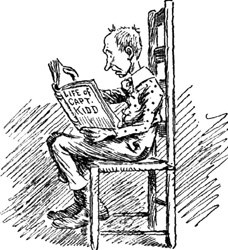
NYE AS A BOY READING ABOUT KIDD.
From this on the struggles of the people up to the time of the Revolution were enough to mortify the reader almost to death. I will not go over them again. It was the history of all the other Colonies; poor, proud, with large masses of children clustering about, and Indians lurking in the out-buildings. The mother-country was negligent, and even cruel. Her political offscourings were sent to rule the people. The cranberry-crops soured on the vines, and times were very scarce.
It was during this period that Captain William Kidd, a New York ship-master and anti-snapper from Mulberry Street, was sent out to overtake and punish a few of the innumerable pirates who then infested the high seas.
Studying first the character, life, and public services of the immoral pirate, and being perfectly foot-loose, his wife having eloped with her family physician, he determined to take a little whirl at the business himself, hoping thereby to escape the noise and heat of New York and obtain a livelihood while life lasted which would maintain him the remainder of his days unless death overtook him.
Dropping off at Boston one day to secure a supply of tobacco, he was captured while watching the vast number of street-cars on Washington Street. He was taken to England, where he was tried and ultimately hanged. His sudden and sickening death did much to discourage an American youth of great brilliancy who had up to 1868 intended to be a pirate, but who, stumbling across the "Life and Times of Captain Kidd, and his Awful Death," changed his whole course and became one of the ablest historians of the age in which he lived.
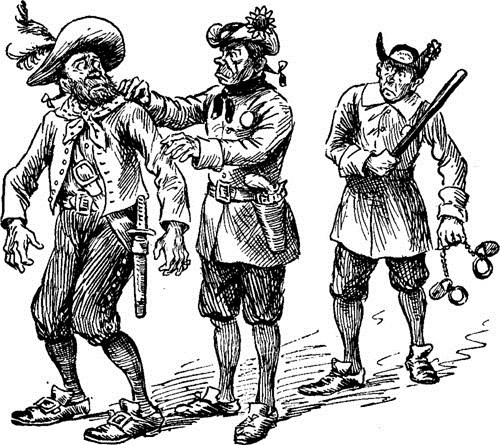
CAPTAIN KIDD ARRESTED.
This should teach us to read the papers instead of loaning them to people who do not subscribe.
Since the above was written, the account of the death of Governor Andros is flashed across the wires to us. Verbum sap. Also In hoc signo vinces.
The author wishes to express by this means his grateful acknowledgments to his friends and the public generally for the great turn-out and general sympathy bestowed upon his relative, the late Peter B. Stuyvesant, on the sad occasion of his funeral, which was said to be one of the best attended and most successful funerals before the war. Should any of his friends be caught in the same fix, the author will not only cheerfully turn out himself, but send all hands from his place that can be spared, also a six-seated wagon and a side-bar buggy.
CHAPTER IX.
SETTLEMENT OF THE MIDDLE STATES
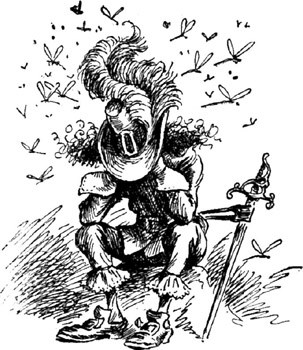
BERKELEY IN NEW JERSEY.
The present State of New Jersey was a part of New Netherland, and the Dutch had a trading-post at Bergen as early as 1618. After New Netherland passed into the hands of the Dutch, the Duke of York gave the land lying between the Hudson and the Delaware to Lord Berkeley and Sir George Carteret for Christmas.
The first permanent English settlement made in the State was at Elizabethtown, named so in honor of Sir George's first wife.
Berkeley sold his part to some English Quakers. This part was called West Jersey. He claimed that it was too far from town. It was very hard for a lord to clear up land, and Berkeley missed his evenings at the Savage Club, and his nose yearned for a good whiff of real old Rotten Row fog.
So many disputes arose regarding the title to Jersey that the whole thing finally reverted to the crown in 1702. When there was any trouble over titles in those days it was always settled by letting it revert to the crown. It has been some years now, however, since that has happened in this country.
Thirty-six years later New Jersey was set apart as a separate royal province, and became a railroad terminus and bathing-place.
Delaware was settled by the Swedes at Wilmington first, and called New Sweden. I am surprised that the Norsemen, who it is claimed made the first and least expensive summer at Newport, R. I., should not have clung to it.
They could have made a good investment, and in a few years would have been strong enough to wipe out the Brooklyn police.
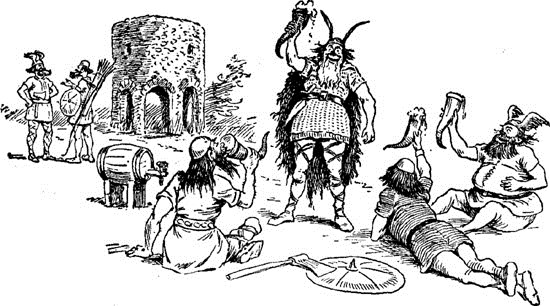
CHEAPEST NEWPORT SEASON.
The Swedes, too, had a good foothold in New York, Jersey, and Delaware, also a start in Pennsylvania. But the two nations seemed to yearn for home, and as soon as boats began to run regularly to Stockholm and Christiania, they returned. In later years they discovered Minneapolis and Stillwater.
William Penn now loomed up on the horizon. He was an English Quaker who had been expelled from Oxford and jugged in Cork also for his religious belief. He was the son of Admiral Sir William Penn, and had a good record. He believed that elocutionary prayer was unnecessary, and that the acoustics of heaven were such that the vilest sinner with no voice-culture could be heard in the remotest portion of the gallery.
The only thing that has been said against Penn with any sort of semblance of truth was that he had some influence with James II. The Duke of York also stood in with Penn, and used to go about in England bailing William out whenever he was jailed on account of his religious belief.
Penn was quite a writer (see Appendix). He was the author of "No Cross, No Crown," "Innocency with her Open Face," and "The Great Cause of Liberty of Conscience."
From his father he had inherited a claim against the government for sixteen thousand pounds, probably arrears of pension. He finally received the State of Pennsylvania as payment of the claim. The western boundary took in the Cliff House and Seal Rocks of San Francisco.
Penn came to America in 1682 and bought his land over again from the Indians. It is not strange that he got the best terms he could out of the Indians, but still it is claimed that they were satisfied, therefore he did not cheat them.
The Indian, as will be noticed by reading these pages thoughtfully, was never a Napoleon of finance. He is that way down to the present day. If you watch him carefully and notice his ways, you can dicker with him to better advantage than you can with Russell Sage.
Take the Indian just before breakfast after two or three nights of debauchery, and offer him a jug of absinthe with a horned toad in it for his pony and saddle, and you will get them. Even in his more sober and thoughtful moments you can swap a suit of red medicated flannels with him for a farm.
Penn gathered about him many different kinds of people, with various sorts and shades of belief. Some were Free-Will and some were Hard-Shell, some were High-Church and reminded one of a Masonic Lodge working at 32°, while others were Low-Church and omitted crossing themselves frequently while putting down a new carpet in the chancel.
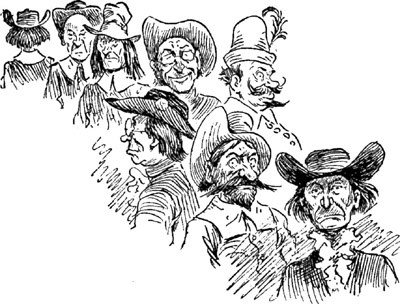
A FEW OF PENN'S PEOPLE.
But he was too well known at court, and suspected of knowledge of and participation in some of the questionable acts of King James, so that after the latter's dethronement, and an intimation that Penn had communicated with the exiled monarch, Penn was deprived of his title to Pennsylvania, for which he had twice paid.
Penn was a constant sufferer at the hands of his associates, who sought to injure him in every way. He rounded out a life of suffering by marrying the second time in 1695.
In 1708 he was on the verge of bankruptcy, owing to the villany and mismanagement of his agent, and was thrown into Fleet Street Prison, a jail in which he had never before been confined. His health gave way afterwards, and this remarkable man died July 30, 1718.
Philadelphia was founded in 1683 and work begun on a beautiful building known as the City Hall. Work has steadily progressed on this building from time to time since then, and at this writing it is so near completion as to give promise of being one of the most perfect architectural jobs ever done by the hand of man.
In two years Philadelphia had sprung from a wilderness, where the rank thistle nodded in the wind, to a town of over two thousand people, exclusive of Indians not taxed. In three years it had gained more than New York had in fifty years. This was due to the fact that the people who came to Philadelphia had nothing to fear but the Indians, while settlers in New York had not only the Indians to defend themselves against, but the police also.
Penn and his followers established the great law that no one who believed in Almighty God should be molested in his religious belief. Even the Indians liked Penn, and when the nights were cold they would come and crawl into his bed and sleep with him all night and not kill him at all. The Great Chief of the Tribes, even, did not feel above this, and the two used frequently to lie and talk for hours, Penn doing the talking and the chief doing the lying.
It is said that, with all the Indian massacres and long wars between the red men and the white, no drop of Quaker blood was ever shed. I quote this from an historian who is much older than I, and with whom I do not wish to have any controversy.
After Penn's death his heirs ran the Colony up to 1779, when they disposed of it for five hundred thousand dollars or thereabouts, and the State became the proprietor.
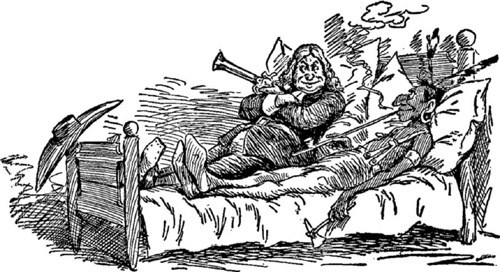
PENN AND THE BIG CHIEF.
The seventeenth century must have been a very disagreeable period for people who professed religion, for America from Newfoundland to Florida was dotted with little settlements almost entirely made up of people who had escaped from England to secure religious freedom at the risk of their lives.
In 1634 the first settlement was made by young Lord Baltimore, whose people, the Catholics, were fleeing from England to obtain freedom to worship God as they believed to be right. Thus the Catholics were added to the list of religious refugees,—viz., the Huguenots, the Puritans, the Walloons, the Quakers, the Presbyterians, the Whigs, and the Menthol Healers.
Terra Mariæ, or Maryland, was granted to Lord Baltimore, as the successor of his father, who had begun before his death the movement for settling his people in America. The charter gave to all freemen a voice in making the laws. Among the first laws passed was one giving to every human being upon payment of poll-tax the right to worship freely according to the dictates of his own conscience. America thus became the refuge for those who had any peculiarity of religious belief, until to-day no doubt more varieties of religion may be found here than almost anywhere else in the world.
In 1635 the Virginia Colony and Lord Baltimore had some words over the boundaries between the Jamestown and Maryland Colonies. Clayborne was the Jamestown man who made the most trouble. He had started a couple of town sites on the Maryland tract, plotted them, and sold lots to Yorkshire tenderfeet, and so when Lord Baltimore claimed the lands Clayborne attacked him, and there was a running skirmish for several years, till at last the Rebellion collapsed in 1645 and Clayborne fled.
The Protestants now held the best hand, and outvoted the Catholics, so up to 1691 there was a never-dying fight between the two, which must have been entertaining to the unregenerate outsider who was taxed to pay for a double set of legislators. This fight between the Catholics and Protestants shows that intolerance is not confined to a monarchy.
In 1715 the fourth Lord Baltimore recovered the government by the aid of the police, and religious toleration was restored. Maryland remained under this system of government until the Revolution, which will be referred to later on in the most thrilling set of original pictures and word-paintings that the reader has ever met with.
QUESTIONS FOR EXAMINATIONQ. Who was William Penn?
A. He founded Pennsylvania.
Q. Was he a great fighter?
A. No. He was a peaceable man, and did not believe in killing men or fighting.
Q. Would he have fought for a purse of forty thousand dollars?
A. No. He could do better buying coal lands of the Indians.
Q. What is religious freedom?
A. It is the art of giving intolerance a little more room.
Q. Who was Lord Baltimore?
A. See foregoing chapter.
Q. What do you understand by rebellion?
A. It is an unsuccessful attempt by armed subjects to overcome the parent government.
Q. Is it right or wrong?
A. I do not know, but will go and inquire.
CHAPTER X.
THE EARLY ARISTOCRACY
Lord Clarendon and several other noblemen in 1663 obtained from Charles II. a grant of lands lying south of Virginia which they called Carolina in honor of the king, whose name was not really Carolina. Possibly that was his middle name, however, or his name in Latin.
The Albemarle Colony was first on the ground. Then there was a Carteret Colony in 1670. They "removed the ancient groves covered with yellow jessamine" on the Ashley, and began to build on the present site of Charleston.
The historian remarks that the growth of this Colony was rapid from the first. The Dutch, dissatisfied with the way matters were conducted in New York, and worn out when shopping by the ennui and impudence of the salesladies, came to Charleston in large numbers, and the Huguenots in Charleston found a hearty Southern welcome, and did their trading there altogether.
We now pass on to speak of the Grand Model which was set up as a five-cent aristocracy by Lord Shaftesbury and the great philosopher John Locke. The canebrakes and swamps of the wild and snake-infested jungles of the wilderness were to be divided into vast estates, over which were proprietors with hereditary titles and outing flannels.
This scheme recognized no rights of self-government whatever, and denied the very freedom which the people came there in search of. So there were murmurings among those people who had not brought their finger-bowls and equerries with them.
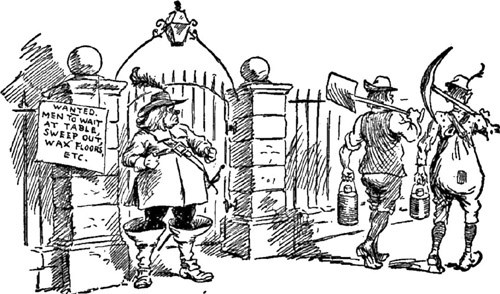
ARISTOCRACY SNUBBED.
In short, aristocracy did not do well on this soil. Baronial castles, with hot and cold water in them, were often neglected, because the colonists would not forsake their own lands to the thistle and blue-nosed brier in order to come and cook victuals for the baronial castles or sweep out the baronial halls and wax the baronial floors for a journeyman juke who ate custard pie with a knife and drank tea from his saucer through a King Charles moustache.
Thus the aristocracy was forced to close its doors, and the arms of Lord Shaftesbury were so humiliated that he could no longer put up his dukes (see Appendix)
There had also been a great deal of friction between the Albemarle or Carteret and the Charleston set, the former being from Virginia, while the latter was, as we have seen, a little given to kindergarten aristocracy and ofttimes tripped up on their parade swords while at the plough. Of course outside of this were the plebeian people, or copperas-culottes, who did the work; but Lord Shaftesbury for some time, as we have seen, lived in a baronial shed and had his arms worked on the left breast of his nighty.

TWO DOLLARS PER BREEZE.
So these two Colonies finally became separate States in the Union, though there is yet something of the same feeling between the people. Wealthy people come to the mountains of North Carolina from South Carolina for the cool summer breezes of the Old North State, and have to pay two dollars per breeze even up to the past summer.
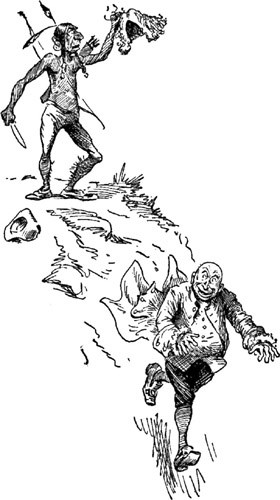
OGLETHORPE'S WIG.
Thus there was constant irritation and disgust up to 1729 at least, regarding taxes, rents, and rights, until, as the historian says, "the discouraged Proprietors ceded their rights to the crown."
It will be noticed that the crown was well ceded by this time, and the poet's remark seems at this time far grander and more apropos than any language of the writer could be: so it is given here,—viz., "Uneasy lies the head that wears a seedy crown." (see Appendix)
The year of Washington's birth, viz., 1732, witnessed the birth of the baby colony of Georgia. James Oglethorpe, a kind-hearted man, with a wig that fooled more than one poor child of the forest, conceived the idea of founding a refuge for Englishmen who could not pay up. The laws were very arbitrary then, and harsh to a degree. Many were imprisoned then in England for debt, but those who visit London now will notice that they are at liberty.
Oglethorpe was an officer and a gentleman, and this scheme showed his generous nature and philanthropic disposition. George II. granted him in trust for the poor a tract of land called, in honor of the king, Georgie, which has recently been changed to Georgia. The enterprise prospered remarkably, and generous and charitable people aided it in every possible way. People who had not been able for years to pay their debts came to Georgia and bought large tracts of land or began merchandising with the Indians. Thousands of acres of rich cotton-lands were exchanged by the Indians for orders on the store, they giving warranty deeds to same, reserving only the rights of piscary and massacre.
Oglethorpe got along with the Indians first-rate, and won their friendship. One great chief, having received a present from Oglethorpe consisting of a manicure set, on the following Christmas gave Oglethorpe a beautiful buffalo robe, on the inside of which were painted an eagle and a portable bath-tub, signifying, as the chief stated, that the buffalo was the emblem of strength, the eagle of swiftness, and the bath-tub the advertisement of cleanliness. "Thus," said the chief, "the English are strong as the buffalo, swift as the eagle, and love to convey the idea that they are just about to take a bath when you came and interrupted them."
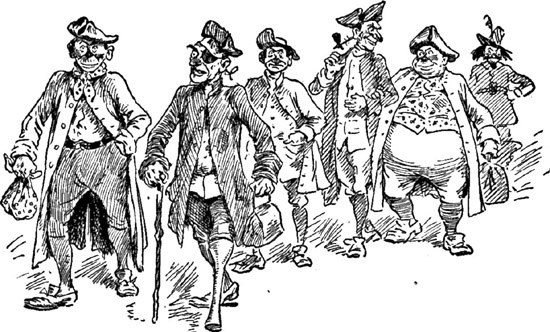
NOT PAID THEIR DEBTS FOR YEARS.
The Moravians also came to Georgia, and the Scotch Highlanders. On the arrival of the latter, the Georgia mosquitoes held a mass meeting, at which speeches were made, and songs sung, and resolutions adopted making the Highland uniform the approved costume for the entire coast during summer.
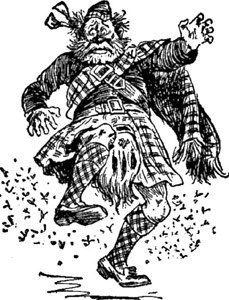
THE MOSQUITOES LIKED THE COSTUME.
George Whitefield the eloquent, who often addressed audiences (even in those days, when advertising was still in its infancy and the advance agent was unheard of) of from five thousand to forty thousand people, founded an orphan asylum. One audience consisted of sixty thousand people. The money from this work all went to help and sustain the orphan asylum. While reading of him we are reminded of our own Dr. Talmage, who is said to be the wealthiest apostle on the road.
The trustees of Georgia limited the size of a man's farm, did not allow women to inherit land, and forbade the importation of rum or of slaves. Several of these rules were afterwards altered, so that as late as 1893 at least a gentleman from Washington, D.C., well known for his truth and honesty, saw rum inside the State twice, though Bourbon whiskey was preferred. Slaves also were found inside the State, and the negro is seen there even now; but the popularity of a negro baby is nothing now to what it was at the time when this class of goods went up to the top notch.
Need I add that after a while the people became dissatisfied with these rules and finally the whole matter was ceded to the crown? From this time on Georgia remained a royal province up to the Revolution. Since that very little has been said about ceding it to the crown.
North Carolina also remained an English colony up to the same period, and, though one of the original thirteen Colonies, is still far more sparsely settled than some of the Western States.
Virginia Dare was the first white child born in America. She selected Roanoke, now in North Carolina, in August, 1587, as her birthplace. She was a grand-daughter of the Governor, John White. Her fate, like that of the rest of the colony, is unknown to this day.
The author begs leave to express his thanks here for the valuable aid furnished him by the following works,—viz.: "The Horse and his Diseases," by Mr. Astor; "Life and Times of John Oglethorpe," by Elias G. Merritt; "How to Make the Garden Pay," by Peter Henderson; "Over the Purple Hills," by Mrs. Churchill, of Denver, Colorado, and "He Played on the Harp of a Thousand Strings, and the Spirits of Just Men Made Perfect," by S. P. Avery.
CHAPTER XI.
INTERCOLONIAL AND INDIAN WARS
Intercolonial and Indian wars furnished excitement now from 1689 into the early part of the eighteenth century. War broke out in Europe between the French and English, and the Colonies had to take sides, as did also the Indians.
Canadians and Indians would come down into York State or New England, burn a town, tomahawk quite a number of people, then go back on snow-shoes, having entered the town on rubbers, like a decayed show with no printing.
There was an attack on Haverhill in March, 1697, and a Mr. Dustin was at work in the field. He ran to his house and got his seven children ahead of him, while with his gun he protected their rear till he got them away safely. Mrs. Dustin, however, who ran back into the house to remove a pie from the oven as she feared it was burning, was captured, and, with a boy of the neighborhood, taken to an island in the Merrimac, where the Indians camped. At night she woke the boy, told him how to hit an Indian with a tomahawk so that "the subsequent proceedings would interest him no more," and that evening the two stole forth while the ten Indians slept, knocked in their thinks, scalped them to prove their story, and passed on to safety. Mrs. Dustin kept those scalps for many years, showing them to her friends to amuse them.
King William's War lasted eight years. Queen Anne's War lasted from 1702 to 1713. The brunt of this war fell on New England. Our forefathers had to live in block-houses, with barbed-wire fences around them, and carry their guns with them all the time. From planting the Indian with a shotgun, they soon got to planting their corn with the same agricultural instrument in the stony soil.
The French and Spanish tried to take Charleston in 1706, but were repulsed with great loss, consisting principally of time which they might have employed in raising frogs' legs and tantalizing a bull at so much per tant.
This war lasted eleven years, including stops, and was ended by the treaty of Utrecht (pronounced you-trecked).
After this, what was called the Spanish War continued between England and Spain for some time. An attempt to capture Georgia was made, and a garrison established itself there, with good prospects of taking in the State under Spanish rule, but our able friend Oglethorpe, the Henry W. Grady of his time, managed to accidentally mislay a letter which fell into the enemy's hands, the contents of which showed that enormous reinforcements were expected at any moment. This was swallowed comfortably by the commander, who blew up his impregnable works, changed the address of his Atlanta Constitution, and sailed for home.







